Home » News & Press
-
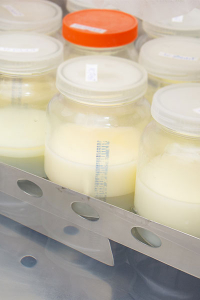
Center Researchers Find No Infectious SARS-CoV-2 in Breast Milk from 110 Lactating Individuals
October 25, 2022While viral materials from SARS-CoV-2 (the virus that causes COVID-19) has sometimes been detected in the breast milk of lactating individuals infected with COVID-19, it’s been uncertain whether this could lead to COVID-19 infection in a breastfed infant due to the small size of prior studies. Our new study, which was published in the journal Pediatric Research, examined this very question with a larger sample of chest/breastfeeding parents.
What did we do? Our Mommy’s Milk research program recruited 110 lactating individuals across the United States between March and September 2020. This included individuals who had a SARS-CoV-2 infection confirmed by RT-PCR, those who had symptoms of COVID-19 but were not tested, those who had symptoms but tested negative for SARS-CoV-2 by RT-PCR, and those exposed to an infected person. We collected information by interviewing moms and collecting two chest/breast milk samples: one when their symptoms peaked and a second milk collection after they had recovered.
What did we find? While we found that RNA (a type of genetic material) from SARS-CoV-2 can be infrequently detected in chest/breast milk after recent infection, we found no evidence that chest/breast milk contains infectious virus. We also found no evidence that breast/chest milk from a COVID-19 infected parent represents a risk factor for transmission of infection to infants.
So what’s the take-away? Lead author Dr. Paul Krogstad, a pediatric infectious disease researcher at the David Geffen School of Medicine at UCLA, said it best: “Breastmilk is an invaluable source of nutrition to infants. In our study, we found no evidence that breastmilk from mothers infected with COVID-19 contained infectious genetic material and no clinical evidence was found to suggest the infants got infected, which suggests breastfeeding is not likely to be a hazard.”
To learn more about our ongoing studies at Mommy’s Milk, visit https://MommysMilkResearch.org/research/ or email MilkStudy@health.ucsd.edu.
-
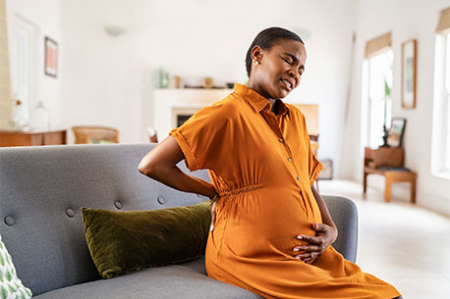
Center for Better Beginnings Launches Its First Study on Lupus Treatment During Pregnancy
October 26, 2022On September 23, 2022 the Center for Better Beginnings at UC San Diego began enrollment for its first study on the treatment of lupus during pregnancy. The study will recruit 400 pregnant people over a five-year period to evaluate use of the lupus drug Benlysta® (belimumab) in pregnancy. Benlysta® is used to treat the most common type of lupus, systemic lupus erythematosus (SLE), as well as lupus nephritis. Currently there is limited information on the drug’s use in pregnancy.
The study will be the Center’s first to focus on a treatment specifically for lupus, and it will be led by perinatal epidemiologist Dr. Christina Chambers, Co-Director of the Center for Better Beginnings and Chief of the Environmental Science and Health Division at UC San Diego. Participants will be enrolled into the Center’s MotherToBaby Pregnancy Studies research program.
“We know lupus can raise the risk of pregnancy complications, so it’s important for both the mom and her developing baby that this condition to be well-managed during pregnancy,” said Chambers. “So, when treatments for lupus like belimumab are available, we want to do our best to gather information about those pregnancies where this medication has been used.”
The study is enrolling those with and without exposure to Benlysta®, and will provide critical information on the use of this medication during pregnancy. Participants will not be asked to change any part of their health care routine, including medications, nor will they be asked to travel. MotherToBaby Pregnancy Studies are conducted by the non-profit Organization of Teratology Information Specialists and coordinated at the Center for Better Beginnings.
More about OTIS and MotherToBaby
The Organization of Teratology Information Specialists (OTIS) is a professional scientific society made up of individuals engaged in assessing and evaluating risks to pregnancy and breastfeeding from environmental exposures. Members include, but are not limited to, specialists in the fields of obstetrics and gynecology, pediatrics, genetics, dysmorphology, perinatal epidemiology, teratology, behavioral teratology, pharmacy, genetic counseling, nursing, midwifery, maternal and child health, public health, and includes experts that provide MotherToBaby services and researchers that conduct MotherToBaby Pregnancy Studies. MotherToBaby is a suggested resource by many federal agencies including the Centers for Disease Control and Prevention (CDC). MotherToBaby is supported by the Health Resources and Services Administration (HRSA) of the U.S. Department of Health and Human Services (HHS) as part of an award totaling $6,000,000 with zero percentage financed with non-governmental sources. The contents of this release are those of the author(s) and do not necessarily represent the official views of, nor an endorsement, by HRSA, HHS or the U.S. Government. To learn more about MotherToBaby and OTIS, please visit MotherToBaby.org.
-

Researchers Continue Study of COVID-19 Vaccinations, Pregnancy and Postpartum
June 23, 2022With the SARS-CoV-2 pandemic ongoing, researchers at University of California San Diego School of Medicine, in collaboration with the American Academy of Allergy Asthma and Immunology (AAAAI), will continue a national study to evaluate the safety of COVID-19 vaccinations during pregnancy, and monitor immune response for mother and baby following vaccinations.
Published research has found that pregnant people are particularly vulnerable to SARS-CoV-2 infection and at higher risk of developing a more serious or complicated disease course, including approximately a 70 percent increased risk of death. Infection in pregnancy also increases the risk for preterm delivery and other adverse pregnancy outcomes, including stillbirth.
“Pregnant people are considered a priority population for COVID-19 vaccination. However, only about a third of pregnant persons have chosen vaccination,” said Christina Chambers, PhD, MPH, principal investigator on the Vaccines and Medications in Pregnancy Surveillance System (VAMPSS) coordinated by AAAAI, professor in the Department of Pediatrics at UC San Diego School of Medicine and director of the Organization of Teratology Information Specialists (OTIS) MotherToBaby Pregnancy Studies.
-
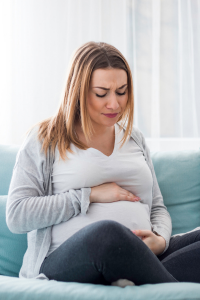
Center Launches Pregnancy & Lactation Studies on Functional Constipation Treatment
August 20, 2021UC San Diego Center for Better Beginnings’ researchers have launched two new studies investigating the treatment of functional constipation in pregnancy and lactation. The studies are examining the use of Motegrity® (prucalopride), a medication used to treat chronic idiopathic constipation (CIC) and irritable bowel syndrome with constipation (IBS-C).
Both of these new studies are led by our Co-Director, UC San Diego perinatal epidemiologist Dr. Christina Chambers. With limited data currently available on the effects of Motegrity® if taken while pregnant or chestfeeding, these studies will provide both pregnant and nursing parents and their healthcare providers with information that will allow them to make more informed treatment decisions for a healthier – and more comfortable – pregnancy and chestfeeding experience.
“Functional constipation is not an uncommon condition, and can be quite uncomfortable,” said Chambers. “However, there is little information about the use of medications to treat functional constipation in pregnant or lactating women.”
The Pregnancy Study: The MotherToBaby Pregnancy Study is enrolling those with and without exposure to Motegrity®, and will provide critical safety information on the use of this medication during pregnancy. Participants will not be asked to change any part of their health care routine, including medications, nor will they be asked to travel. MotherToBaby Pregnancy Studies are conducted by the non-profit Organization of Teratology Information Specialists and coordinated at the Center for Better Beginnings.
Visit MotherToBaby Pregnancy Studies
The Lactation Study: Mommy’s Milk: Human Milk Research Biorepository is conducting a study with chestfeeding people who are taking Motegrity® while nursing. Participants will be interviewed by phone, asked to provide milk samples at different time points over a 24-hour period before and after taking a dose of Motegrity®, complete questionnaires about baby’s growth and development, and release baby’s medical records. Volunteers will receive up to $125 for completing the study.
-
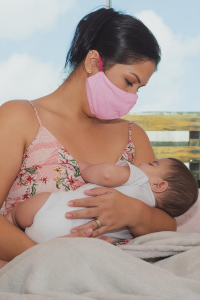
Is COVID-19 Transmitted Through Breast Milk? Not Likely, Our New Study Suggests
August 19, 2020As SARS-CoV-2, the novel coronavirus that causes COVID-19, continues to spread around the world, so do the concerns of breastfeeding mothers. Although there have been no documented cases to date of an infant contracting COVID-19 as a result of consuming infected breast milk, the critical question of whether there is potential for this form of mother-to-infant transmission remains. Our latest study, published August 19, 2020 in the online edition of JAMA, sought to answer this question.
What did we do?
Since March 2020, our Mommy’s Milk: Human Milk Biorepository has been collecting breast milk samples by mail from breastfeeding women throughout the U.S. who reported being symptomatic for COVID-19, having been exposed to an infected person, or having a confirmed SARS-CoV-2 infection. In preparation for analyzing these samples, in collaboration with colleagues at the University of California Los Angeles we developed and validated an RT-PCR test (a laboratory technique) for detecting SARS-CoV-2 in breast milk. We also developed a test to determine if any virus found in milk would be able to replicate; the ability of the virus to replicate is a key component of determining whether an infant could be infected by consuming milk that contains the virus. Last, we developed techniques to mimic the type of pasteurization that human milk banks use to screen donor milk for infection; we did this so we could determine if these techniques are able to eliminate any virus in milk. The study was partly supported by Emergency COVID-19 Research Seed Funding provided by the University of California Office of the President.
What did we find?
Between March 27 and May 6, we enrolled 18 women who had a confirmed SARS-CoV-2 positive test; these 18 women provided a total of 64 breast milk samples that were collected at different time points before and after their positive test result. Of the 64 milk samples that were collected, we only detected virus in one sample; however, subsequent tests found that the virus was unable to replicate. In addition, infectious virus could not be detected in milk samples following pasteurization.
So what’s the take-away?
According to the lead investigator on this study, director of Mommy’s Milk, and our Center co-Director Dr. Tina Chambers, PhD, MPH: “Detection of virus does not equate to infection. It has to grow and multiply in order to be infectious and we did not find that in any of our samples. Our findings suggest breast milk itself is not likely a source of infection for the infant.” She also added that our pasteurization findings are “a very positive finding for donor milk, which so many infants – especially those born premature – rely on.”
However, she also cautioned that more research is needed: “Our findings fill in some important gaps but more studies are needed with larger sample sizes to confirm these findings.” To that end, our future work will not only look at whether breast milk is free of the virus, but also if it contains active antiviral components, such as antibodies to SARS-CoV-2 that women may produce after exposure to the virus and that they can then give to their infants through breast milk, protecting the infant from COVID-19.
-

Use of Antidepressants in Pregnancy May Pose Risk for Newborns
June 10, 2020Major depression affects approximately 8% of pregnant women in the United States, and 7-13% of pregnant women use antidepressants during pregnancy. Because untreated depression in pregnancy is associated with poorer outcomes for both mom and baby, medication and/or non-medication treatment is encouraged. However, more information is needed about whether and how antidepressant medications could impact a pregnancy and the baby. The study we just published in Pediatrics sought to evaluate the risk for certain pregnancy and newborn complications, namely pre-term birth, heart defects in the newborn, and respiratory distress in the newborn.
What did we do? We obtained data for nearly 227,000 singleton births between 2012-2016 from the OptumLabs Data Warehouse, a database that contains de-identified medical and pharmacy claims, lab results, and enrollment records for over 200 million privately insured or Medicare enrollees across a mix of ages, ethnicities and geographical regions in the US. We then looked at whether and when the women filled a prescription for an antidepressant during their pregnancy and the dosage that was prescribed. We then categorized the women based on their patterns of antidepressant use, resulting in 5 groups: (1) women with low dosages who reduced or stopped taking their antidepressant during their first trimester of pregnancy; (2) women with low dosages who continued taking their antidepressant throughout pregnancy; (3) women with moderate dosages who reduced or stopped taking their antidepressant during their first trimester of pregnancy; (4) women with moderate dosages who continued taking their antidepressant throughout pregnancy; and (5) women with high dosages who continued taking their antidepressant throughout pregnancy. We then compared the groups to see if there were differences in the rates of pre-term birth, newborn heart defects, and newborn respiratory distress. Funding for the study was partly provided by the National Institutes of Health (NIH), and we received access to the OptumLabs data from a University of California–OptumLabs research credit.
What did we find? We found that 15,041 (6.6%) of the pregnancies were exposed to an antidepressant. In comparing our 5 groups, we found that continued use of moderate (~40 mg/day of fluoxetine) or high dosages (~80 or more milligrams per day) of antidepressants increased the chance of preterm birth. We also found that compared to Group 1 (the women on low doses who reduced or stopped take their antidepressant during their 1st trimester), the other four groups had an increased chance of newborn respiratory distress, with those taking the highest dosages at the highest risk. Finally, we found that taking moderate dosages of antidepressants throughout pregnancy increased the chance of infant heart defects, but this finding was no longer significant when we compared them to women with depression or anxiety who did not take antidepressants, suggesting that the underlying depression or anxiety may play a role in risk for heart defects.
So what’s the take-away? Our study largely confirmed the findings of previous research suggesting there may be some increased infant risks when taking antidepressants during pregnancy, particularly if the mother is taking moderate-to-high dosages over the course of her pregnancy. The lead investigator on this study and our Center faculty member Dr. Gretchen Bandoli, PhD, MPH, stressed that “We cannot emphasize enough the importance of treating underlying depression or anxiety during pregnancy, as both conditions are linked to poorer outcomes for both mom and baby. What our findings suggest is that when the method of treatment is an antidepressant, health providers should consider treating the mom with the lowest effective dose that will benefit both mom and baby and they should also monitor mom and baby for these outcomes.
-

Migraines in Pregnancy and the Risk of Maternal Stroke
June 01, 2020Over 28 million women in the US suffer from migraines, and when they happen in pregnancy previous research has suggested that this can increase the risk of maternal stroke. The study we just published in JAMA Neurology sought to determine the extent to which pre-existing blood pressure-related disorders increase this risk.
What did we do? We obtained data from the State of California for birth certifications and hospital discharge summaries for 3 million singleton, live births between 2007-2012. We examined these records for medical codes associated with migraines, strokes, and hypertensive disorders including high blood pressure and preeclampsia, a pregnancy complication characterized by high blood pressure, swelling, and protein in maternal urine. In our analysis, we adjusted for other factors that are commonly associated with stroke, such as age, maternal body mass index, race/ethnicity, maternal smoking, drug, and alcohol use, and maternal diabetes. Funding for the study was partly provided by the California Preterm Birth Initiative at the University of California San Francisco.
What did we find? We found that in 914 out of every 100,000 deliveries women suffered from migraines; in addition, strokes occurred in 29 out of every 100,000 deliveries. Compared to women without migraines, women with migraines during pregnancy were more likely to have a hypertensive disorder and to have a stroke during pregnancy or postpartum. In our analyses, hypertensive disorders explained 21% of the risk for stroke among women with migraines during pregnancy and delivery, and 27% of the risk for a postpartum stroke among women with migraines.
So what’s the take-away? Accordingly to the lead investigator on this study and our Center faculty member Dr. Gretchen Bandoli, PhD, MPH: “The findings suggest that by managing hypertension and preeclampsia in pregnancy, approximately one-quarter of the cases of stroke that can be attributed to migraines could potentially be prevented. Cardiologists should thus continue to counsel their pregnant patients on the importance of well-controlled blood pressure, particularly before and during pregnancy.”
However, she also cautioned that more research is needed: “Hypertension only accounted for one-quarter of the excess risk of maternal stroke associated with migraine, which indicates there are other risk factors that we have not yet quantified. Although maternal stroke is rare during pregnancy, delivery, and in the postpartum period, it can be deadly. We need more research to identify other factors contributing to stroke risk among women with migraines that can be modified to reduce the risk of a mom having a stroke.”
-

Mommy’s Milk Receives Donated Supplies for COVID-19 Breastfeeding Study
May 05, 2020In response to the COVID-19 pandemic, our Mommy’s Milk program launched a study to confirm early findings that the virus is not present in milk, and to determine if and when maternal antibodies to the virus can be found in breast milk. “We’re collecting and analyzing a larger number of samples than have been reported in the scientific literature to date. Hopefully, the results of our study can be used to provide reassurance to women that breastfeeding with COVID-19 infection doesn’t pose a risk to the infant, and will also help us learn whether antibodies may be passed along that could protect the infant from infection,” said lead investigator and Mommy’s Milk director Dr. Tina Chambers.
Recognizing the urgent need for research in this area, Medela, a company best known for the advancement of breast milk technology, has announced that they will be donating breast milk pumps and milk storage bags to support our study efforts. “Since the beginning of this crisis, moms around the world have reached out to us for guidance and answers around COVID-19 and breastfeeding,” said Annette Brüls, CEO of Medela. “We fully agree with UNICEF that breast milk is the best nutrition for infants, especially in times like these. It is well known that breast milk provides dynamic immunologic protection. Therefore, we are excited to support such research projects to gain in-depth understanding of the natural defense mechanisms through breast milk and the presence of antibodies in it.”
The supplies will be used to capture milk samples from breastfeeding women across the U.S and Canada with known or suspected COVID-19 infection. “The pandemic came on so quickly that we had to launch the study without an identified funding source to support all of the research activities. Thanks to the generosity of Medela, the supplies that we need to obtain the breast milk samples are one less expense that we’ll have to worry about,” added Chambers.
Read more about Medela
About Mommy’s Milk: Mommy’s Milk is a human milk biorepository that is dedicated to research, with the goal of establishing a clinical database of breast milk samples that can be used to help us better understand the relationship between human milk and infant and child health and development. The Mommy’s Milk COVID-19 Breastfeeding Study is collaborating with other UC San Diego School of Medicine research partners, including the Larsson-Rosenquist Foundation Mother-Milk-Infant Center of Research Excellence (led by Dr. Lars Bode).
-
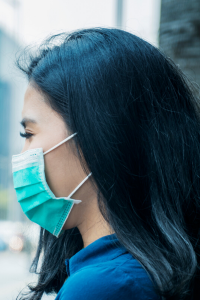
Our New Studies Offer First COVID-19 in Pregnancy & Breastfeeding Investigations
March 27, 2020Researchers at the Center for Better Beginnings have launched two new studies examining the effects of the novel coronavirus (COVID-19) in pregnancy and breastfeeding.
An observational study coordinated by our MotherToBaby Pregnancy Studies is currently enrolling women with known or suspected COVID-19 infection during a current or recent pregnancy or within 30 days of a woman’s last menstrual period before conception.
“To date, there are only a few case reports of pregnancy outcomes following maternal infection with this new virus,” said our Co-Director Christina Chambers, PhD, MPH, lead investigator of MotherToBaby Pregnancy Studies, professor in the Department of Pediatrics at UC San Diego and current president of the Organization of Teratology Information Specialists (OTIS), the non-profit organization comprised of birth defects experts and which provides the no-cost MotherToBaby information service. “However, prior research on respiratory infections, such as seasonal influenza, has indicated that pregnant women in general are at higher risk than non-pregnant women for complications from the infection, which in turn can lead to more common pregnancy complications, such as preterm delivery. In addition, a high fever early in pregnancy may pose a risk for the developing fetus.”
The study will recruit pregnant women who reside anywhere in the United States or Canada. Mothers will be interviewed by telephone over the course of their pregnancy and postpartum period and will be asked to release relevant medical records from their and their baby’s health care providers. This information will be used to assess the course of pregnancy and outcomes for both mother and infant. This work will be coordinated with other efforts being initiated throughout the U.S. and other countries.
In addition, our Mommy’s Milk: Human Milk Biorepository is launching a study looking at breastfeeding women with known or suspected COVID-19 infection. Using a common protocol developed in coordination with UC San Diego’s MOMI CORE, mothers will be interviewed by phone and will be asked to provide some biological samples from themselves and their infant, including a sample of breast milk. Information will also be gathered on the infant’s growth and developmental outcomes.
“Women and their health care providers need answers as quickly as possible regarding the effects of COVID-19 during pregnancy and while breastfeeding,” said Chambers. “We know that pregnant and breastfeeding moms are contracting COVID-19, but the fact of the matter is that we know very little about its short-and long-term effects on a developing baby.”
If you would like to join our important new studies, please contact us for more information.
-
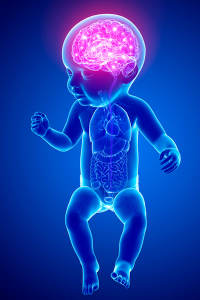
Center Receives Funding for Planning Phase of HEALthy Brain and Child Development Study
October 17, 2019The use of opioids during pregnancy has been linked to a number of adverse outcomes, including serious birth defects, premature birth, miscarriage or stillbirth, and neonatal opioid withdrawal syndrome (NOWS), where a newborn infant experiences opioid withdrawal after exposure in the womb. What remains largely unknown is whether and how prenatal exposure to opioids impacts a child’s brain and development.
To help us move toward answering these questions, Center for Better Beginnings co-director Christina Chambers, PhD, MPH, was recently awarded a grant from the National Institute of Drug Abuse. Our team at UC San Diego, along with teams at 27 other sites across the US, will lead the development of a nationwide study called the HEALthy Brain and Child Development (HEALthy BCD) Study. Underneath this planning grant, Dr. Chambers and the multidisciplinary team that she has assembled at UC San Diego – including researchers in psychiatry, obstetrics/maternal fetal medicine, neonatology, clinical psychology, ethics, bioengineering, and epidemiology – will design recruitment strategies and data collection protocols for this massive longitudinal study. “The proposed main study will track roughly 10,000 children from fetal life through about 10 years of age to examine the short and long-term effects of prenatal substance exposure in the context of other social and environmental factors,” Chambers said, “During this initial planning phase, our team and others at 27 additional institutions across the nation will work to identify, test, and recommend strategies to engage and support participants in a respectful and ethical manner, and to outline a common protocol for the assessment of brain development, neurobehavioral performance and other health outcomes that will be integral components of the study.” The work done during this planning phase will inform future research on the effects of opioids and other substances in young children and identify new opportunities for intervention to support child development.
The HEALthy BCD Study was made possible by the National Institutes of Health’s Helping to End Addiction Long-term (HEAL) Initiative; under this initiative, nearly $1 billion in funding has been pledged to help tackle the national opioid crisis.
-

MotherToBaby California Celebrates its 40th Anniversary
October 24, 2019The very first MotherToBaby information service is celebrating its 40th year of service at the UC San Diego Center for Better Beginnings this October! Program Founder and current Medical Director Dr. Ken Lyons Jones recalled that when he joined UC San Diego in 1974 as a new pediatrician, he was fresh off the publication of his seminal paper that first described Fetal Alcohol Syndrome, a condition that results in brain damage and growth problems in a child when alcohol is consumed during pregnancy. As a specialist focused on identifying and treating children with birth defects, Dr. Jones noticed that he started receiving an increasing number of calls from his healthcare colleagues and from women in the local community who wanted to know about the effects of different environmental exposures (like medications a mom was taking) during pregnancy and while breastfeeding.
“What we’d do was say, ‘We don’t know, but we could find out!’ Then we’d race over to the library and look up everything that we could find on that drug. We’d find all kinds of information about the effects of the medication on a rat, guinea pig or mouse – and we would call back the woman and tell her everything that we found out about the effects on that rat, guinea pig and mouse. And she’d say ‘that is really interesting – but what about me?’ And we’d say, unfortunately there’s no information about how it affects human health or developing fetus,” said Dr. Jones while addressing the audience at our October 3rd celebration. The volume of calls he received suggested to Dr. Jones a dire need in the community, so in 1979 Dr. Jones founded the first “teratogen information service” – a service dedicated to providing up-to-date, evidence-based information about environmental exposures during pregnancy and while breastfeeding. Initially called the San Diego County Teratogen Registry, the program soon expanded organically – and by necessity – into a parallel research program to collect pregnancy information from women with select exposures so that critical information gaps on medication safety could be filled.
Over the years, the name of the service changed a few times. In 1989, it became the California Teratogen Information Service (CTIS) and Clinical Research Program. Later, the program became an affiliate of the non-profit Organization of Teratology Information Specialists (OTIS), and when OTIS changed the name of the information service to MotherToBaby in 2013, MotherToBaby California was born! Similarly, the research program has evolved over time and is now known as MotherToBaby Pregnancy Studies, one of the largest pregnancy registries on medicines and vaccines in North America.
As the first-of-its-kind, MotherToBaby California has been used as a model nationally and worldwide for the development of other teratogen information services. Importantly, in its 40 year history the program has always been available at no-cost to the public. It has been supported by continuous funding since 1981 from the California Department of Education, and since 2014 has also received sub-awardee funding from the U.S. Health Resources & Services Administration.
Earlier this month, moms, community partners, and current and former program staff came together to celebrate the monumental achievements of the program. The value of the program, as one mom shared, was that “While there were a lot of unknowns about my medications, I at least felt like I had some information and I could make an educated decision – not one based on fear.” Please join us in celebrating the origins and accomplishments of MotherToBaby California and our continued effort to promote the health of moms and babies and reduce the risk of preventable birth defects!
-
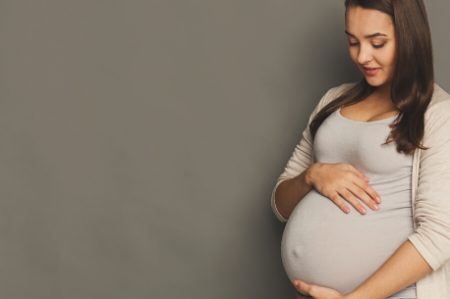
Center Researchers Find Adalimumab Exposure in Pregnancy Does Not Increase Birth Defects Risk
October 18, 2019Adalimumab (sold under the trade name Humira®) is a medication used to treat a number of autoimmune diseases, including rheumatoid arthritis and Crohn’s Disease. But what effects might it have if it is taken during pregnancy? Our new study, which was published today in the journal Public Library of Science (PLOS) One, examined this very question.
What did we do? As part of our MotherToBaby Pregnancy Studies, we recruited 602 pregnant women across the United States and Canada between 2004-2016. This included women who had or had not taken adalimumab for their autoimmune disease, as well as generally healthy pregnant women for comparison. Women were followed until they delivered their babies, and their babies were followed up to 1 year of age. We collected information by interviewing moms, examining medical records, and conducting a specialized exam with the babies. Funding for the study was provided by AbbVie.
What did we find? We found that the use of adalimumab in pregnancy is not associated with an increased risk for adverse outcomes, such as major structural birth defects, spontaneous abortion, and preterm delivery. We also found that regardless of whether they took adalimumab, pregnant women with rheumatoid arthritis or Crohn’s Disease were at an increased risk of delivering their baby pre-term (before 37 weeks of pregnancy).
So what’s the take-away? The lead investigator on this study and our Center co-director Dr. Tina Chambers, PhD, MPH, said it best: “Many women hoping to start a family rely on adalimumab to control symptoms related to crippling autoimmune diseases such as rheumatoid arthritis or Crohn’s Disease. The fact that this study showed no increased risk in adverse birth outcomes with the use of adalimumab in pregnancy is important since not a lot of research was previously available on this particular medication.”
She added that, “Studies on medication use in general are lacking when it comes to understanding their effects on pregnancy, making it difficult for pregnant women and their healthcare providers to make informed decisions,” said Dr. Chambers. “We are proud to add valuable information to the literature and encourage more pregnant women to consider volunteering for critical observational studies.”
To learn more about our ongoing MotherToBaby Pregnancy Studies, visit www.MotherToBaby.org/Studies, call (877) 311-8972, email MotherToBaby@ucsd.edu.
-

Mommy’s Milk Team Finds Marijuana in Breast Milk Up To Six Days After Use
August 27, 2018With the legalization of marijuana in several US states, increased use has been seen in pregnant and breastfeeding women for both medicinal and recreational purposes. Although national organizations like the American Academy of Pediatrics recommend breastfeeding mothers do not use marijuana, there has been a lack of current data to support any health or neurodevelopmental concerns in infants as a result of exposure to tetrahydrocannabinol (THC) or other components of marijuana via breast milk.
“Pediatricians are often put into a challenging situation when a breastfeeding mother asks about the safety of marijuana use. We don’t have strong, published data to support advising against use of marijuana while breastfeeding, and if women feel they have to choose then we run the risk of them deciding to stop breastfeeding – something that we know is hugely beneficial for both mom and baby,” said Christina Chambers, PhD, MPH, principal investigator of the study, program director of Mommy’s Milk, and co-director of the Center for Better Beginnings.
Cannabinoids, marijuana’s active compounds, such as THC, like to stick to fat, which is abundant in breast milk. This stickiness has suggested that in women who use marijuana, these compounds can end up in breast milk, raising concerns about their potential effects on nursing babies.
To better understand how much marijuana actually gets into breast milk and how long it stays there, our Mommy’s Milk team conducted a study published online today in the journal Pediatrics. We examined 54 breast milk samples from 50 women who used marijuana either daily, weekly or sporadically – with inhalation being the primary method of intake. THC, the primary psychoactive component of marijuana, was detected in 63 percent of the breast milk samples up to six days after the mother’s last reported use.
“We found that the amount of THC that the infant could potentially ingest from breast milk was relatively low, but in some mothers could be detected as long as six days after the mother last used marijuana. We still don’t know enough about the drug to say whether or not there is a concern for the infant at any dose, or if there is a safe dosing level,” said Dr. Chambers. “The ingredients in marijuana products that are available today are thought to be much more potent than products available 20 or 30 years ago.”
Dr. Chambers believes that the results are a stepping stone for future research. More studies need to be done not only to determine the long-term impact for children, if any, of marijuana in breast milk, but more specifically, “are there any differences in effects of marijuana in breast milk for a two-month old versus a 12-month old, and is it different if the mother smokes versus eats the cannabis? These are critical areas we need answers to as we continue to promote breast milk as the premium in nutrition for infants.”
Study co-authors include: Kerri Bertrand, MPH; Nathan Hanan, PharmD; Gordon Honerkamp-Smith, MS; and Brookie Best, PharmD, MAS, all with UC San Diego.
-

Center Researchers Provide More Accurate Estimates of FASD in US
February 06, 2018Fetal Alcohol Spectrum Disorders (FASD) are costly, life-long disabilities that are 100% preventable, but estimates of how commonly they occur have been outdated and based on small, non-diverse samples. Not any more! With funding from the National Institute on Alcohol Abuse and Alcoholism and working with colleagues at the University of North Carolina – Chapel Hill and the University of New Mexico, our experts recently published research that provides an updated estimate of how common FASD are in the United States, including right here in Southern California. What did we find? FASD are more common than previously thought, and may be as common as (and in some cases, more common than) autism. The study was published in the Journal of the American Medical Association.
To find out how common Fetal Alcohol Spectrum Disorders (FASD) are, our research team collaborated with other researchers to evaluate first-grade children in 4 regions of the United States. A total of 6,639 children were assessed on their physical growth, key facial features, and their cognitive and behavioral development, and their mothers were interviewed about alcohol use during their pregnancy with the participating child. Across the 4 study regions, we found that about 1% to 5% of children were estimated to have FASD. This was the most conservative estimate and assumed that no additional cases of FASD would have been found in children who did not participate in the study. But when we applied an alternate approach that assumed the prevalence of FASD that we found in participating children would be the same in non-participating children in each community, the estimated prevalence of FASD was even higher, ranging from about 3% to 10% of children.
So what does this mean? These estimates suggest that harmful levels of prenatal alcohol exposure are common in the U.S. today; they also highlight the public health burden due to FASD. A well-known developmental disorder, Autism Spectrum Disorders, is estimated to affect about 1.5% of children; our study suggests that FASD may be just as common as, and in some cases more common than, autism! According to Dr. George Koob, the director of the National Institute on Alcohol Abuse and Alcoholism, “FASD is a leading cause of developmental disabilities worldwide. Understanding the prevalence of FASD in the U.S. is needed to determine the public health burden of FASD and to identify the need for resources to treat the disorders. These findings underscore the need for targeted programs for children with FASD and for interventions to prevent alcohol use during pregnancy.
-

Nine Months Matter Public Awareness Campaign Launches to Promote Alcohol-Free Pregnancies
October 23, 2017UC San Diego’s Center for Better Beginnings and the newly formed volunteer task force, Better Beginnings Coalition, announce the launch of Nine Months Matter Advocacy Campaign—a public awareness event to alert the community that no amount of alcohol during pregnancy is safe. Nine Months Matter will educate the community on the effects of alcohol on a developing baby with the goal to reduce the number of children born in the U.S. with Fetal Alcohol Spectrum Disorders (FASD) by 80% by the year 2025. The campaign kicked off on September 30th at the La Jolla Beach and Tennis Club with Dr. Kenneth Lyons Jones, Center for Better Beginnings Co-Director, Dr. Miguel del Campo, Center for Better Beginnings Faculty Member and founding member of the European FASD Alliance, and Judge Marian Gaston with the Superior Court of San Diego County. The event was sponsored by the Morrison and Foerster Foundation and Quest Diagnostics.
In 1973 Dr. Jones and his mentor Dr. David Smith described Fetal Alcohol Syndrome and made the connection between brain injury in newborns and alcohol consumed during pregnancy. Children born with FASD have social, educational and behavioral disabilities. In school, these children have severe learning disabilities. In addition, they have a difficult time assessing right from wrong and don’t understand consequences; as a result, these children and young adults unfortunately often end up in the legal system.
Research has shown consuming alcohol during pregnancy is more dangerous to a developing baby than cocaine, heroin or methamphetamine. Misinformation is common; many times women are told by their physicians that having a drink or two while pregnant is safe. However, alcohol crosses the placenta and there is no time during pregnancy when it is safe to drink because the brain is constantly developing.
If you would like to join the Better Beginnings Coalition, contact campaign chair Mary Reynolds at mreynolds52@san.rr.com. Visit Nine Months Matter for more information or follow on Facebook at https://www.facebook.com/ninemonthsmatter/.
-
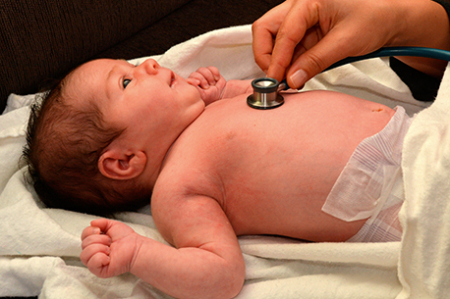
Risk for Developmental Delay Following Prenatal Alcohol Exposure May Be Detectable in Baby’s Heart Rate Pattern
July 28, 2017Working with colleagues at the UC San Diego Jacobs School of Engineering and elsewhere, our experts recently published research suggesting that an early screen looking at certain changes in a baby’s heart rate pattern, called cardiac orienting response (COR), may be a better early predictor for developmental delay following prenatal alcohol exposure (PAE) that standardized developmental testing. Why is this important? The effects of PAE on a child’s development often are not diagnosed until the child begins to struggle in school, and standardized tests for developmental delay are often costly and labor-intensive. An easy and effective screening tool like COR could make it possible to identify and treat these children much earlier in life while their brains are still developing. The study was published in the journal Alcoholism: Clinical & Experimental Research.
-
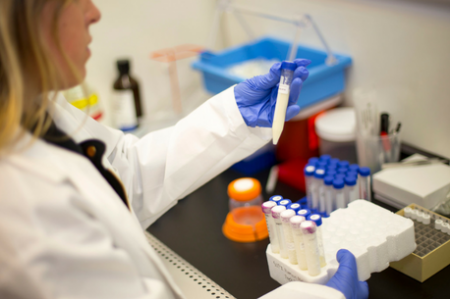
Mommy’s Milk Lands Funding to Study Marijuana Use During Lactation
June 08, 2017One substance of rapidly growing public health interest is marijuana. With increasing access to legal recreational marijuana in the U.S., the question of the safety of its use during breastfeeding has risen in prominence. Nearly 11% of women who are either pregnant or breastfeeding use marijuana; however, there are insufficient data on marijuana use during pregnancy and lactation or the potential developmental consequences for exposed children.
In response to the pervasive lack of data in this area, Mommy’s Milk has been awarded a three-year $110,000 grant from the Gerber Foundation to measure the concentration of cannabinoids (the various components of the Cannabis sativa plant) in human milk and to examine selected infant health related outcomes.
This work will begin to fill an important gap in public health knowledge, and will ultimately help support clinical guidance and education regarding marijuana use during lactation for obstetricians and pediatricians alike.
Mommy’s Milk was established in 2014 at the University of California San Diego’s Center for Better Beginnings with support from Rady Children’s Hospital, San Diego. It is a national resource for multidisciplinary researchers seeking to study various aspects of breast milk in relation to health, disease and medication exposures. To date, 530 breast milk samples are stored and available for research purposes.
Breastfeeding women can learn more about study participation at www.mommysmilkresearch.org or by sending an email to milkstudy@ucsd.edu. Researchers can contact the study manager directly.
Study Principal Investigator Contact: Dr. Christina D. Chambers, 858-246-1704, chchambers@ucsd.edu
Study Manager Contact: Kerri Bertrand, 858-246-1713, kdutcher@ucsd.edu
-
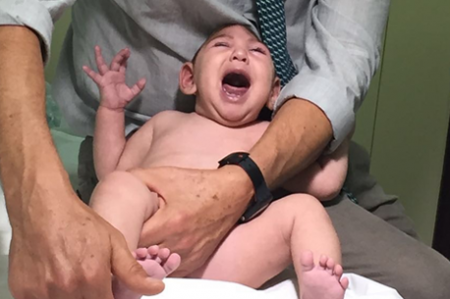
What Does Congenital Zika Virus Look Like?
April 19, 2017Miguel del Campo, MD, PhD, associate professor at UC San Diego’s Center for Better Beginnings and dysmorphologist for MotherToBaby, describes the set of observable characteristics of the Zika virus in a new paper published in the American Journal of Medical Genetics.
-
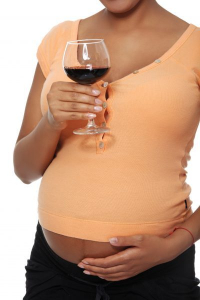
Researchers Develop Potential Blood Test for FASD
November 09, 2016Working with colleagues at the Texas A&M College of Medicine and the Omni-Net Birth Defects Prevention Program in Ukraine, our experts identified a blood test that may help predict how severely a baby will be affected by alcohol exposure during pregnancy. Published in the journal PLOS ONE, the findings could facilitate early intervention to improve the health of infants and children who were prenatally exposed to alcohol.
-

1st Annual Walkfest for Alcohol-Free Pregnancies
September 01, 2016UC San Diego’s Center for Better Beginnings, SoCal NOFAS, and the Rady Children’s Hospital Auxiliary are raising awareness about the effects of alcohol on a developing baby through the community event, Nine Months Matter: Walkfest for Healthy, Alcohol-Free Pregnancy.
Why is a yearly event dedicated to alcohol-free pregnancies necessary? Because Fetal Alcohol Spectrum Disorders are 100% preventable by abstaining from alcohol while pregnant.
-
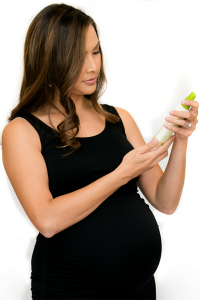
CDC Recommends MotherToBaby
August 22, 2016The Centers for Disease Control and Prevention (CDC) recommends MotherToBaby as a go-to resource for information on the Zika virus in pregnancy. Families can speak to an information specialist about a possible Zika virus infection or diagnosis. As part of the MotherToBaby network, our MotherToBaby California experts are available by phone, email or live-chat for free services in English or Spanish.
MotherToBaby has been a long-standing resource recommended by the CDC on medication and other exposures in pregnancy and breastfeeding, and we are proud to stand together in the fight against Zika.
-
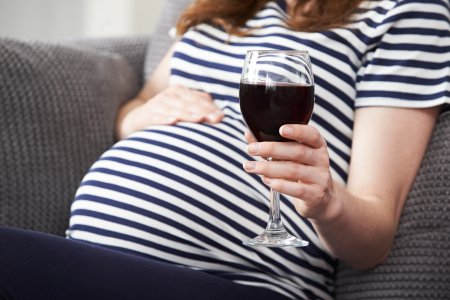
How Can We Best Reach Moms at Risk for FASD?
July 21, 2016What can we do to reach women at risk of drinking alcohol during pregnancy?
Annika Montag, PhD, a postdoctoral scholar at UC San Diego’s Center for Better Beginnings, published a paper on this topic in the International Journal of Women’s Health. According to Dr. Montag, “This review explores the pros and cons of three common approaches used to identify women at risk for having a child with Fetal Alcohol Spectrum Disorder (FASD). We found that a combination of two approaches was most effective to reach at-risk women: a self-assessment to obtain a report from the woman about her alcohol consumption plus biomarker screenings to pinpoint genetic predisposition to alcohol’s harmful effects.”
-

How Safe Are Mom’s Anxiety Medications On Her Unborn Baby?
April 06, 2019Up to 15% of pregnant women have an anxiety disorder, and 1-4% of them are treated with benzodiazepines (like Valium®, Xanax® or Klonopin®) or z-drugs (like Ambien®). In addition, it’s not uncommon for women with anxiety to also be treated for depression, or for benzodiazepines to be used in combination with a prescription opioid for pain management. But what effects might benzodiazepines and z-drugs, in isolation or in combination with an antidepressant or a prescription opioid, have on longer-term developmental outcomes in a pregnant woman’s baby? Our new study examined this very question.
How did we do it? We accessed a large dataset from the Norwegian Mother and Child Cohort Study, which followed over 41,000 pregnant women from 1999 to 2008 and had child follow-up data from 6 months to 8 years of age. In the study were 4,195 women who before and/or during pregnancy had a depression/anxiety disorder, 5,260 with a sleeping disorder, and 26,631 with a pain-related disorder. We looked at whether the timing of benzodiazepine/z-drug exposure (mid-pregnancy vs. late pregnancy) had any effects on the child’s longer-term development; whether longer vs. shorter duration of use (multiple 4-week vs. 1-week intervals) had any effect; and how the use of benzodiazepines/z-drugs in isolation or in combination with an antidepressant or a prescription opioid affected the child’s development. The child outcomes we looked at were the development of both motor and communication skills as well as attention problems when the children were around 5 years of age.
What did we find? Our findings suggested no increased risk for attention problems or fine motor deficits after benzodiazepine/z-drug exposure at different time points in pregnancy. We also did not find any evidence suggesting there was a developmental risk based on how long the mom used these drugs, nor any increased risk if benzodiazepines/z-drugs were used in combination with either antidepressants or a prescription opioid. There was an increased risk of gross motor and communication deficits among children whose mothers had depressive/anxiety disorders and used benzodiazepines/z-drugs late in pregnancy (week 29 or later), but the deficits were below clinically relevant cutoff points and could be accounted for by the mom’s underlying psychiatric conditions and/or the higher doses she was taking.
So what’s the take-away? Our findings suggest no substantial detrimental risk to child fine motor skills and attention problems after prenatal exposure to benzodiazepines/z-drugs alone or in combination with opioids or antidepressants. While an increased risk of gross motor and communication deficits was found, the deficits were not clinically significant and could be explained by other factors. As with any medication, pregnant women or women planning a pregnancy should talk with their healthcare provider before starting or stopping any medications.
-
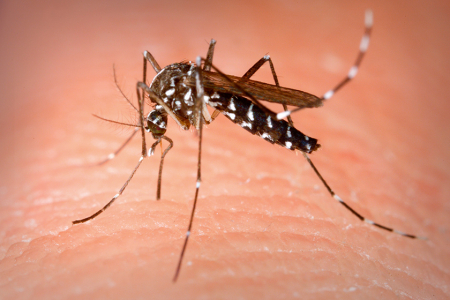
World Renowned Experts Discuss Zika Risks, Mechanisms & Prevention
July 01, 2016UC San Diego’s Center for Better Beginnings hosted a special Zika virus symposium on Friday, July 1, 2016. The symposium aimed to educate medical professionals, researchers and public health officials on the current status of the microcephaly epidemic caused by the Zika virus, how Zika can disrupt fetal brain development, and the mechanisms of the virus that could impact immunity and drug discovery.
“We want the community to hear first-hand the experience of Brazil in battling this epidemic, and hear what we at UCSD are doing to help,” said Miguel del Campo, MD, PhD, associate clinical professor at UC San Diego Center for Better Beginnings and medical geneticist at Rady Children’s Hospital-San Diego who traveled to Brazil to examine babies born with Zika microcephaly.
Symposium presenters included del Campo; Brazilian scientist Lavinia Schuler-Faccini, MD, PhD; and UCSD professors Alysson Muotri, PhD, and Tariq Rana, PhD. Schuler-Faccini is lead author of one of the first ground-breaking studies in Brazil to examine the association between the Zika virus in pregnant women and microcephaly in their babies, and is President of the Brazilian Society of Medical Genetics (Sociedade Brasileira de Genetica Medica).
-
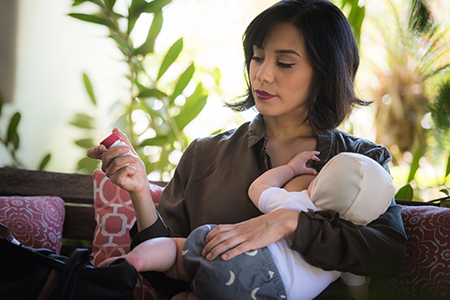
How Safe Is Your Medication While Breastfeeding?
May 11, 201690% of breastfeeding women take at least one medication, but there is little to no information about whether or how much of the medicine will reach her nursing baby. The safe use of medications during breastfeeding is not an easy subject to study, but, as this Nature editorial contends, it has a bright future because of our program: Mommy’s Milk Human Milk Research Biorepository.
Learn why our mission of contributing to drug safety information for lactating moms is so necessary.
-

Validation of the Pregnancy Asthma Control Test
March 31, 2016Effective management of asthma is believed to reduce the risk for pregnancy-related complications. In an article published in the Journal of Allergy and Clinical Immunology: In Practice, lead author Dr. Kristin Palmsten and others from the Center for Better Beginnings explored how reliable telephone questionnaires were in assessing a mom’s control over her asthma during pregnancy using The Asthma Control Test (ACT).
What did our research team find — and is this in agreement with US guidelines?
- Page 1
